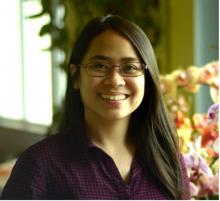
Herdeline Ann (Digs) M. Ardoña is an Assistant Professor at the UC Irvine Department of Chemical and Biomolecular Engineering, with joint appointments in the Department of Chemistry and Department of Biomedical Engineering. She is a native of Valenzuela City, Philippines. She received her B.S. in Chemistry from the University of the Philippines Diliman in 2011. In 2017, she completed her Ph.D. in Chemistry at Johns Hopkins as a Schlumberger Foundation and Howard Hughes Medical Institute fellow, developing synthetic peptide assemblies as bioelectronic nanomaterials. She then worked as a postdoctoral researcher in the Disease Biophysics Group at the Wyss Institute for Biologically Inspired Engineering and John A. Paulson School of Engineering and Applied Sciences at Harvard University. As the 2018-2020 ACS Irving S. Sigal Postdoctoral Fellow, she investigated the structural and functional impacts of multiple engineered nanomaterials through microphysiological platforms and biohybrid models. Her current research group at UCI focuses on the development of bioinspired materials that uniquely transduce optical or electronic phenomena at excitable cellular interfaces, specifically designed towards: (i) influencing cell or tissue behavior through photonic processes; (ii) in situ probing of contractile tissue function in response to external biological cues; or (iii) mimicking the native properties of the local microenvironment of electromechanical tissues.




